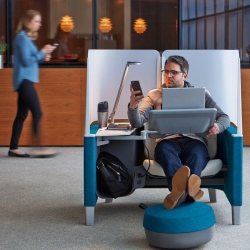To provide the best experiences, we use technologies like cookies to store and/or access device information. Consenting to these technologies will allow us to process data such as browsing behaviour or unique IDs on this site. Not consenting or withdrawing consent, may adversely affect certain features and functions.
The technical storage or access is strictly necessary for the legitimate purpose of enabling the use of a specific service explicitly requested by the subscriber or user, or for the sole purpose of carrying out the transmission of a communication over an electronic communications network.
The technical storage or access is necessary for the legitimate purpose of storing preferences that are not requested by the subscriber or user.
The technical storage or access that is used exclusively for statistical purposes.
The technical storage or access that is used exclusively for anonymous statistical purposes. Without a subpoena, voluntary compliance on the part of your Internet Service Provider, or additional records from a third party, information stored or retrieved for this purpose alone cannot usually be used to identify you.
The technical storage or access is required to create user profiles to send advertising, or to track the user on a website or across several websites for similar marketing purposes.
 A continued disconnect between HR, Finance and business leaders is an important driver of the UK’s enduring low productivity levels, a new report claims. The research commissioned by OrgVue, claims that if better organisational planning was adopted by UK organisations, GDP could be boosted by £10.4 billion due to improved productivity. (more…)
A continued disconnect between HR, Finance and business leaders is an important driver of the UK’s enduring low productivity levels, a new report claims. The research commissioned by OrgVue, claims that if better organisational planning was adopted by UK organisations, GDP could be boosted by £10.4 billion due to improved productivity. (more…)
















 You’re probably aware of the experiment performed by Stanley Milgram in which volunteers were asked by men in white coats to administer what they believed to be electric shocks to another person, who they could not see, but could hear, from behind a screen. Around two-thirds of the volunteers agreed to deliver what they were told to be potentially fatal shocks to the subject, who they could hear screaming and begging them to stop. What they didn’t know was the person they were agreeing to inflict this on was in fact an actor.
You’re probably aware of the experiment performed by Stanley Milgram in which volunteers were asked by men in white coats to administer what they believed to be electric shocks to another person, who they could not see, but could hear, from behind a screen. Around two-thirds of the volunteers agreed to deliver what they were told to be potentially fatal shocks to the subject, who they could hear screaming and begging them to stop. What they didn’t know was the person they were agreeing to inflict this on was in fact an actor. 


















January 14, 2020
The Fourth Industrial Revolution is upon us and we`re not ready for it
by Jamie Morgan • Comment, Technology